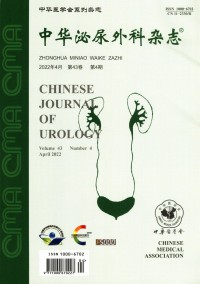Factors influencing unplanned re-operation of prostatic cancer and its countermeasures
Q4 Medicine
引用次数: 0
Abstract
Objective To analyze the main causes for unplanned re-operation of prostatic cancer. Methods The clinical data of 4 patients with prostatic cancer who underwent an unplanned re-operation were analyzed retrospectively between September 2014 and July 2019 in our hospital.Preoperative data of patients was collected as follows: mean age of 65 years, ranged from 56 to 71 years.tPSA ranged from 5.17-13.20 ng/ml.Gleason score of 3+ 3 in 1 case, 3+ 4 in 2 cases, 4+ 4 in 1 case. pTNM pT2a in 2 Cases, pT2b in 2 cases. LRP(extraperitoneal approach) in 1 case, RARP(transperitoneal approach) in 3 cases. Results The main causes for unplanned re-operation were as follows: perioperative hemodynamic instability(75%, 3/4), post-operative fever(25%, 1/4). All 4 re-operations were performed by urologists using Laparoscopic exploration of abdomen. Conclusions Inadequate and inappropriate surgical hemostasis are the key to lead a second-look surgery of prostatic cancer.A complete hemostasis could help to lower the re-operation rate.Laparoscopic exploration of abdomen could be one of the choices to deal with re-operation after minimally invasive radical prostatectomy. Key words: Prostatic neoplasms; Prostatectomy; Minimally invasive; Unplanned re-operation; Complications影响癌症非计划再手术的因素及对策
目的分析前列腺癌非计划再手术的主要原因。方法回顾性分析我院2014年9月至2019年7月4例非计划再手术前列腺癌患者的临床资料。患者术前资料收集如下:平均年龄65岁,56 ~ 71岁。tPSA范围为5.17 ~ 13.20 ng/ml。Gleason评分3+ 3 1例,3+ 4 2例,4+ 4 1例。pTNM pT2a 2例,pT2b 2例。LRP(腹腔外入路)1例,RARP(腹腔经入路)3例。结果非计划再手术的主要原因是围手术期血流动力学不稳定(75%,3/4),术后发热(25%,1/4)。所有4例再次手术均由泌尿科医师采用腹腔镜腹部探查。结论手术止血不充分和不当是导致前列腺癌二次手术的关键。彻底止血有助于降低再手术率。腹腔镜下腹部探查是处理微创前列腺根治术后再手术的选择之一。关键词:前列腺肿瘤;前列腺切除术;微创;再次手术;尚可计划外并发症
本文章由计算机程序翻译,如有差异,请以英文原文为准。
求助全文
约1分钟内获得全文
求助全文
来源期刊

中华泌尿外科杂志
Medicine-Nephrology
CiteScore
0.10
自引率
0.00%
发文量
14180
期刊介绍:
Chinese Journal of Urology (monthly) was founded in 1980. It is a publicly issued academic journal supervised by the China Association for Science and Technology and sponsored by the Chinese Medical Association. It mainly publishes original research papers, reviews and comments in this field. This journal mainly reports on the latest scientific research results and clinical diagnosis and treatment experience in the professional field of urology at home and abroad, as well as basic theoretical research results closely related to clinical practice.
The journal has columns such as treatises, abstracts of treatises, experimental studies, case reports, experience exchanges, reviews, reviews, lectures, etc.
Chinese Journal of Urology has been included in well-known databases such as Peking University Journal (Chinese Journal of Humanities and Social Sciences), CSCD Chinese Science Citation Database Source Journal (including extended version), and also included in American Chemical Abstracts (CA). The journal has been rated as a quality journal by the Association for Science and Technology and as an excellent journal by the Chinese Medical Association.
 求助内容:
求助内容: 应助结果提醒方式:
应助结果提醒方式:


